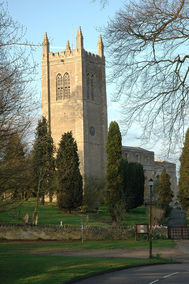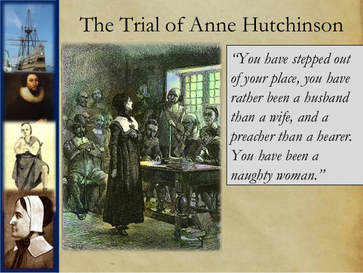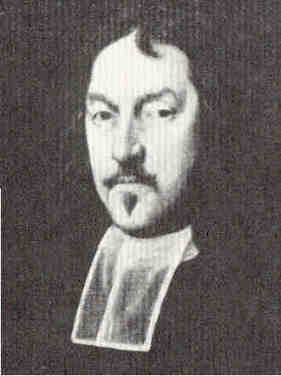
Apparently, Bulkeley had had enough. Within a year, he boarded the Susan and Ellen for the Colonies as part of The Great Migration (1630 – 1640). Soon after arriving, he and Major Simon Willard negotiated with a local tribe the purchase of Musketaquid, which lay on the western fringe. In the spring of 1637, he led a party into the wilderness and settled at Musketaquid, which he later renamed Concord in gratitude for its peaceful acquisition.

He died 9 March 1659 in Concord, but his reputation continued. During King Philip’s War, an Indian council deferred attacking Concord because ‘Bulkeley is there, the man of the big pray.’
----------------------------------------------------------------------------------------------
(Bulkeley first appears in “The Immigrant” at a meeting with two managers from the Saugus Iron Works.)
John Gifford and William Awbrey entered the Concord meetinghouse. They brushed the dust from their clothing as Goodman Robert Blood and Captain Simon Willard, two Concordians who had requested the meeting, led them down the aisle. Awbrey and Gifford straddled two benches with their hosts sitting across from them.
“We appreciate thy efforts to endure such an arduous journey,” said Blood.
“So far from the coast and near Indian country, are we safe?” asked Gifford.
Blood turned to Captain Simon, who spoke. “Indians reside across the river, but they bear no malice.”
Blood turned back to Gifford. “Captain Willard first trekked here in 1636. There was no Bay Road then, like ye road thou just traveled. He had to hack briars and avoid the marshlands. With the grace of God he arrived at Musketaquid. He still remains adventurous, resides across the river and thus encounters Indians. He may say they bear no malice, but many of Concord’s good men believe to the contrary. However, it is the Captain’s discovery along the river that hath given rise for this meeting.”
Blood gestured to Willard who spoke. “Soil near the riverbank hath intriguing colors and unusual odors. Not ideal for farming but, perchance, ideal for mining. Iron ore, or even copper may bless ye soil.”
Gifford’s eyes widened as Blood added, “We want not for investors.” Blood smiled at Willard and continued. “We want men possessed with great wisdom who can assay the bog and turn its ore into metal.” Blood eased back onto the bench. “We have many queries.”
Gifford inhaled deeply and expounded. Blood and Willard listened while Awbrey remained quiet, occasionally brushing the dust from his clothing. Gifford regaled his interested audience with his knowledge of ironworks operations until the meetinghouse door opened and light filled the room. Blood and Willard arose, and Gifford followed their lead. Awbrey eventually rose, too. A man, dressed in drab olive green, stood at the door. A rectangle of finely-meshed white lace, which lay beneath his chin, was the only hint of gaiety. The door creaked as he shut it, and his boots clacked the floor as he moved down the aisle.
“Concord’s esteemed Reverend Peter Bulkeley,” said Blood. “To what do we owe this great honor?”
The clack continued until The Reverend stood among the four. “I prayed for Goodman John Abbot’s justice,” said The Reverend. “But justice hath not been rendered, and with God’s providence, I now speak.”
He turned to the visitors, and Awbrey straightened his slouch. The Reverend’s left eyebrow had a distinct arch, a wise horned owl, alert and ever skeptical to what was about him. “A Concord Ironworks holds great promise. But only Englishmen will toil for it. When we arrived at Musketaquid, we chased depravity to the wilderness. We shall not import more depravity from the east.”
Gifford nodded, but Awbrey remained uneasy.
“Goodman John Abbot and his Goodwife, Rebecca, arrived with me on the Susan and Ellen. Their son, John the junior, was a boy at the time. They did not leave England to still suffer the rage of a Scottish heathen.” The Reverend’s eye latched onto Gifford and he asked, “Dost thou have a John MacLawson in thy servitude?” His eyebrow didn’t flinch as he awaited an answer.
Gifford turned to Awbrey, who shrugged.
“Thou must,” said The Reverend. “It was only through Lord Cromwell’s benevolence that Scottish men were shipped hither.”
The Reverend placed his hands behind his back and paced. “Ah Cromwell, had thy success arrived earlier, my confrontation with Archbishop Laud never would have occurred. I would still be preaching in my blessed Odell. If only God’s providence had . . .” The clack echoed as The Reverend continued to pace and pondered. He spun back and said, “Evildoers seep into our New World. I leave the MacLawson matter with thee. Justice must be rendered.”
Gifford bobbed his head until the owl’s eye blinked. The boots echoed away, and Gifford turned to Blood and said, “Truly, I do not know a John MacLawson.”
“No matter,” said Blood. “When I journeyed with Goodman Abbot several weeks past, his concern was with his loss of income, not with threats from a Scottish dog.”
“Our account books have an entry for a Goodman Abbot,” said Awbrey. “Substantial as I reckon.”
Gifford turned to Blood. “If we employ Goodman Abbot again, would Reverend Bulkeley deem it just?”
“I can’t answer for The Reverend,” he said. “But Goodman Abbot would find it just.”
“Then Awbrey, do it forthwith.”
“I would wait until the weather cools,” said Blood. “Felling trees in summer is, indeed, unjust.”
“Surely, even dogs rest in such heat,” said Gifford.
The meeting adjourned, and Gifford and Awbrey followed their hosts out of the meetinghouse. The hosts headed to The Reverend’s manse where he and others were waiting outside. Awbrey paused at the cart while Gifford climbed aboard it. The Reverend looked toward Awbrey, several times, as he conversed with Blood and Willard. After a few minutes, the group went inside the manse.
Awbrey climbed into the cart and sat next to Gifford. “I suspect the meeting of the investors is now commencing inside the manse,” said Awbrey as he snapped the reins.
“I believe I impressed Goodman Blood and Captain Willard with my knowledge.”
“They have their investors,” said Awbrey, “and thou hast given them thy knowledge. They have no need for us any longer.”
“But we would be partners,” said Gifford.
Awbrey sensed Gifford’s naiveté, and trying to explain the obvious any further seemed pointless. Awbrey remained silent, focusing on the road as he held the reins. After a few minutes, Gifford spoke. “Art thou sure John MacLawson is not one of ours?”
“MacLawson is probably John Law,” said Awbrey. “The names sound similar, particularly when muttered in a Scottish tongue.”
“Then we must give John Law to the constable.”
“If we do, there would be fines. And The Ironworks doth not need another black stain.”
“Alas another black stain,” said Gifford as he frowned. “That wretch MacGoon gave us good one not long ago, fornicating in public.” Gifford grimaced. He pondered a while and asked, “What is less dear to the Ironworks, paying Goodman Abbot a steep wage, or paying John Law’s court fines?”
Awbrey didn’t answer.
Gifford sighed. “Yet another dilemma these Scots create for the Ironworks.” He turned to Awbrey and said, “I believe Becx spoke with a deceptive tongue. Perhaps, I trusted him too much.”
The cart hit a rock and jostled the two. Awbrey concentrated on the road ahead and didn’t respond to Gifford’s newly found insight.


 RSS Feed
RSS Feed
